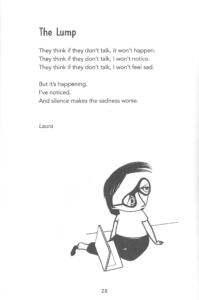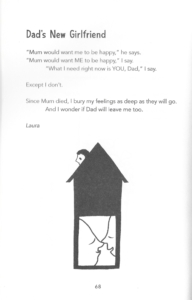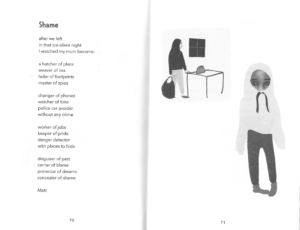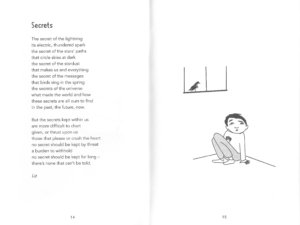The Belonging of Books by Laura Mucha


I spend a lot of my time thinking about the importance of feeling welcome, feeling accepted, feeling like you belong. But sadly, very, very sadly, not all children are born into situations where this is the case. Many are born into abusive or neglectful homes. Many are born into homes with severe substance abuse. Many are born into homes where feeling welcome feels like a luxury as caregivers battle with poverty.
Books are quiet, private places that children can go to make sense of what is going on with them and with the others around them. They give words to things that children and young people themselves may not be able to. They bear witness. They decode. They connect. They can open up urgent but difficult conversations – conversations that say “it’s OK, this isn’t your fault” or “this is important, let’s talk about this” or “you’re not alone”.
So when Matt Goodfellow suggested we write a poetry collection on young people’s mental health and wellbeing with him and Liz Brownlee, I didn’t hesitate. It’s what I spend most of my time thinking about.
We enlisted the help of the brilliant Karen Goodall, who ran the MSC in Children’s Mental Health and Wellbeing Edinburgh University, and discussed the topics that we needed to cover to create a comprehensive collection. Mental health problems don’t generally appear before young people reach their teens, but there are some antecedents that are well known by psychologists and academics – for example, parental divorce; bereavement; ‘insecure attachment’; comparison; racism; poverty. We wrote about each. Matt reflected on his teaching experience, Liz interviewed educational psychologists, social workers and GPs, and I delved into academic research.
Like many important but difficult topics, we don’t talk about these antecedents enough as a society. And the result is that children around the world worry that, following divorce or bereavement, they will lose their other parent too (see for example, the Harvard Bereavement Study). They worry that they were responsible for the death of a loved one because the adults are too scared to talk about bereavement (based on research examining the way we speak to young people about terminal illness). They create thoughts such as ‘I’m not good enough, I’m useless, just give up’ – and we don’t teach them the neurologically proven strategies to see these thoughts as thoughts, rather than facts.


There are a host of things I wish we were doing as a country, as a planet, to support children in their emotional wellbeing and growth. Thankfully there are many phenomenal individuals and organisations working to improve this. But until we live in a world where children’s mental wellbeing is valued and prioritised by policy makers around the world as it should be, what can we do as individuals to make a difference?
We can engender empathy in those lucky enough to be born into safe and loving homes by sharing the experience of others. We can have more empathy ourselves by seeing ‘difficult’ behaviour as distressed behaviour. We can open up and encourage difficult conversations. And we can create connection and comfort by letting young people know that they are not alone, that the damaging behaviour of adults around them is not their fault. In doing so, we can let them know that they – and their emotions, their inner lives, including all the dark and grisly bits – are welcome, accepted, loved. We can let them know that they belong.

There’s something particular about poetry that allows us to broach difficult subjects – that’s why we turn to it for births, weddings and funerals. Its form acts as a container for things that are so gigantic they feel like they might consume us. Its precision pierces through all the noise and helps us pause and reflect. And its smallness makes difficulty feel manageable.

I was recently asked by UNICEF to write a poem explaining the science of love in childhood. It’s a big ask… So I immediately emailed the very brilliant Robbie Duschinsky at Cambridge University, the consultant on a non-fiction book for adults I’m writing about attachment theory. Robbie emailed fellow world-leading thinkers and researchers on the subject. My question for them was – which images do you think best describe love in childhood?
They replied with images such as: the feeling of a parents’ hand around yours; being folded into a huge hug; being helped across stepping stones; and reading a book together.
Just to be clear – some of the world’s best thinkers on the subject of love in childhood, people who had dedicated their entire lives to the study of the subject, cited reading a book together as an image that came to mind when trying to describe it.
It can be demoralising when those in power don’t prioritise the needs of children. But through poetry, through words, through books, we as individuals can help young people find their place in the world.
And in doing so, we can each take microsteps towards creating a society where all children and young people – and their fullness of experience– belong.
Poems taken from Being Me: Poems about Thoughts, Worries and Feelings, by Liz Brownlee, Matt Goodfellow, Laura Mucha, illustrated by Victoria Jane Wheeler, published by Otter-Barry books.
1 Full disclosure – I didn’t technically use the word love. I used the phrase ‘secure attachment’, but John Bowbly, the founder of attachment theory, wanted to use the word ‘love’ but didn’t as he was worried the scientific community wouldn’t like it… So love feels like an acceptable shorthand for what is an incredibly complex theory of human development.



